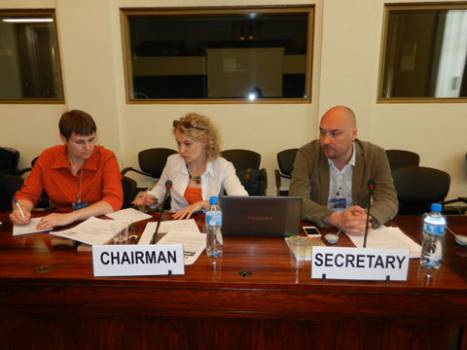Question of non-implementation of UN decisions by Belarus and Russia raised at its 23rd session
On 5 June
as a part of the 23rd session of the UN Human
Rights Council the International Federation
for Human Rights (FIDH) with the support of Human Rights Watch
conducted a briefing on the non-fulfillment of UN resolutions by
Belarus and Russia.
The
speakers who took the floor drew a parallel
between the situation in the two countries and stressed that the
United Nations should step up with
a sharp and immediate criticism of the situation, as
the space for civil society is
shrinking rapidly in the Russian Federation.
Otherwise the situation of squeezing human
rights defenders out of
the legal field and the criminalization of their activities can
quickly reach the
situation in Belarus.
Speaking at the
press briefing Valiantsin
Stefanovich, deputy chairman of the Human Rights Center "Viasna",
described the systematic neglect of UN treaty arrangements by
Belarus, in particular the failure to comply
with the decisions of the UN Human Rights Committee on individual
citizens' complaints
and decisions of the Working Group on Arbitrary
Detention.
Representatives of the human
rights organization "Memorial" told
about the upcoming trial on charges of acting
as a "foreign agent" without proper
registration as such within
the framework of presenting a report to the UN
Committee against Torture. A
representative of the LGBT network presented a report on the
situation of two LGBT organizations, which had
also been prosecuted, and told about the
promotion of a
discriminatory law that prohibits "propaganda of homosexuality".
Employee of the "Agara"
association summed up
the results of harassment
of NGOs in Russia and supported colleagues in the requirements for
the UN to adequately respond to what is happening in the light of the
rapid negative development
of the situation in order to avoid a repetition of the Belarusian
scenario where the opinion of the UN is openly
ignored.
The
briefing generated a
considerable interest. The
present members of UN member states were able
to ask questions and confirm their willingness to attract the
attention of the UN to the issues raised.



















